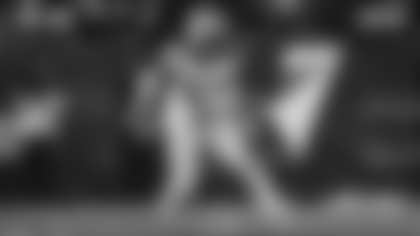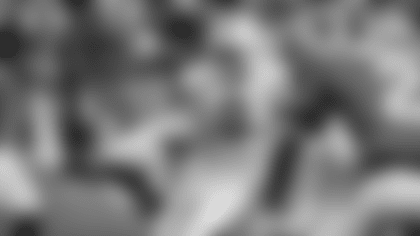Reggie White was one of the few truly great athletes who transformed his game and changed the people around him.
"Where do we begin? Great player, great person, great teammate,'' Brett Favre said as he reflected on the legacy of his friend who will be inducted into the Pro Football Hall of Fame on Saturday, a final, fitting tribute to the most honored and perhaps most feared defensive end in NFL history.
"It goes without saying that he's deserving of this, and just a shame he passed this young.''
White, who suffered from sleep apnea and sarcoidosis, died a little more than 18 months ago at age 43.
When news of his stunning death reached Mike Holmgren in Seattle, the man who helped lure the Minister of Defense from Philadelphia to Green Bay in the biggest free-agent move in league history, said simply: "I am a better person for having been around Reggie White.''
Amen to that, said LeRoy Butler.
"A lot of leaders wait until you get to the locker room to lead,'' Butler said. "Not Reggie. He'd go to your house if he had to. You never needed to go looking for Reggie. He came to you.''
White had his critics, to be sure, especially after his infamous speech to Wisconsin lawmakers in 1998 when he blasted homosexuality and used ethnic stereotypes when describing the gifts each race brings to the tapestry of humanity.
White apologized for offending so many, but never backed down from what he considered his true calling: to sack sin as much as quarterbacks.
"I hope that my life serving God and doing what he called me to do would overshadow anything I did in football,'' White told The Associated Press in 1998.
Preaching, praying or playing, White was fervent.
"He'd be picking quarterbacks up saying, 'God bless you,' but he'd be whooping the guy in front of him every time,'' recalled Denver safety John Lynch. "Really, I think he's as good a football player as there's ever been. This guy was dominant. He had a presence that was just bigger than life.''
White took that same passion from the football field to the pulpit, to inner-city schools, to the streets, to the homeless.
"He ministered to everybody, but his first ministry was to his teammates,'' Butler said. "Because he knew that if he could get you to live right, the team was better off.''
After an All-American senior season at Tennessee, White began his pro career with the Memphis Showboats of the USFL in 1984. He joined the Philadelphia Eagles, who held his NFL rights, after the USFL folded in 1985. For eight years he was as an integral piece in Philadelphia's Gang Green defense.
White combined size, speed and strength like no defensive lineman before him, getting a league-high 21 sacks in only 12 games in the strike-shortened 1987 season.
Buddy Ryan, who coached the Eagles from 1986-1990, agreed with Holmgren that White was "probably the best defensive lineman that ever played.''
When the NFL welcomed unfettered free agency and the salary cap in 1993, many figured Green Bay, the league's smallest outpost, was doomed. Instead, with White leading the way, the Packers experienced a reversal of fortunes.
His selection of the Packers also proved to other players, particularly blacks, that Wisconsin wasn't a winter wasteland. Before his arrival, Green Bay, a quarter-century removed from the glory days of Vince Lombardi, was known as the frigid outpost where other teams threatened to send their malcontents, the NFL's very own Siberia.
"If he hadn't have come over, we never would have gotten Bruce Wilkerson, Sean Jones, Ron Cox, Andre Rison, Desmond Howard, all these guys we won a championship with,'' Butler said. "He changed us from a place nobody wanted to go to a place where, by the mid '90s, we had to turn free agents away.''
White and his wife, Sara, appreciated the unpretentious nature of Green Bay. While they were being wined and dined at the finest restaurants across the country, the Packers took them to Red Lobster to make their pitch.
"I told him, 'You're already a great football player. Come here and you'll be a legend,''' recalled former general manager Ron Wolf.
He did, and a faded franchise shined anew.
Opponents game-planned around White and his enormously powerful club move, and so did the Packers.
"You just knew,'' said Keith Jackson, who played with White in Philadelphia and Green Bay, "that if you needed a game closed out, he was going to be the guy to close it out.''
That's precisely what he did in the biggest game of his life, the Super Bowl following the 1996 season, when he sacked Drew Bledsoe a record three times to secure Green Bay's 35-21 win over New England.
White played 15 seasons with Philadelphia, Green Bay and Carolina. He retired after the 2000 season as the NFL's career sacks leader with 198, a mark that was subsequently passed by Bruce Smith. A two-time NFL Defensive Player of the Year, White was elected to the Pro Bowl a record 13 straight times from 1986-98.
"As intimidating as he was on the field, he was probably the biggest kid in the locker room,'' Favre said. "And guys were able to go up and talk to him and it didn't feel like he was too big.''
Jackson once boasted while they were in Philadelphia that he could block White 1-on-1 and White accepted his challenge. But at the whistle, Jackson stepped to the side and White fell flat on his face, got up laughing and a lifelong friendship was born.
Butler said White was a locker room cutup who could hold his own with Eddie Murphy or Chris Rock.
"He was just a naturally funny guy,'' Butler said, "a 6-foot-5, 315-pound gentle giant making everyone laugh. I'm laughing right now just remembering him.''














